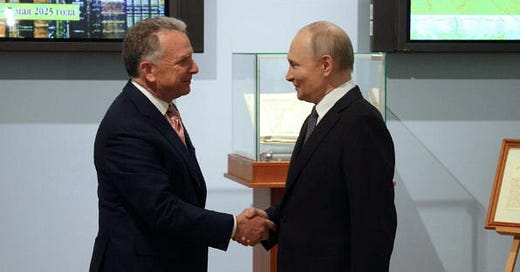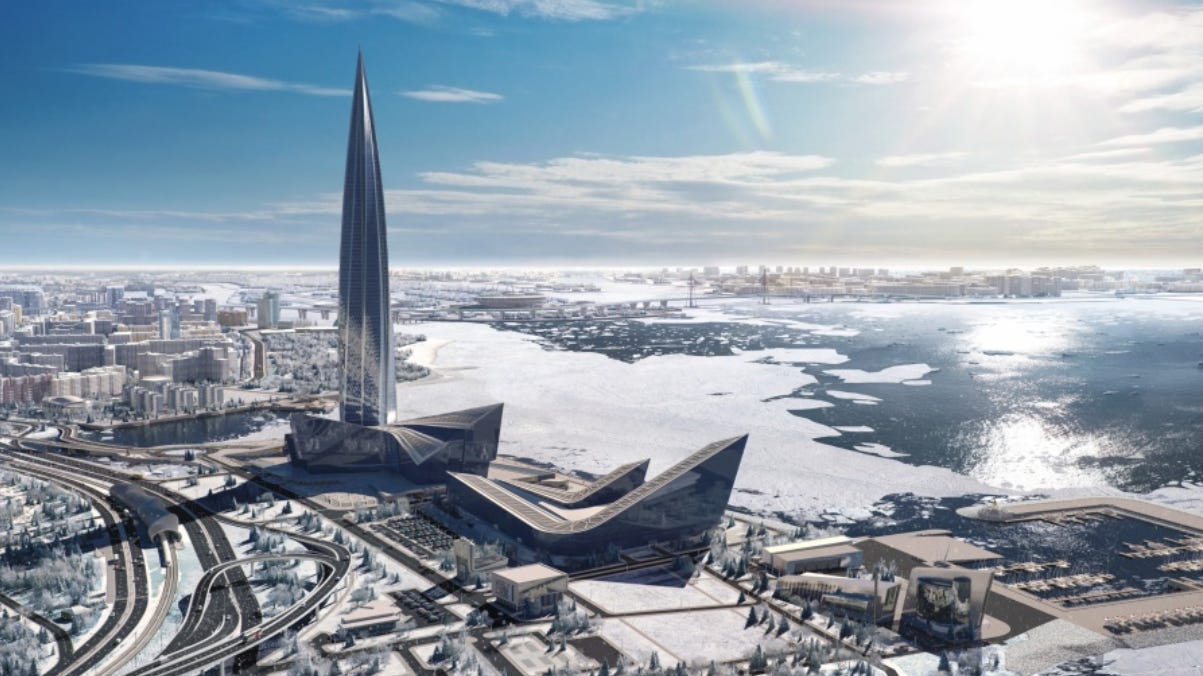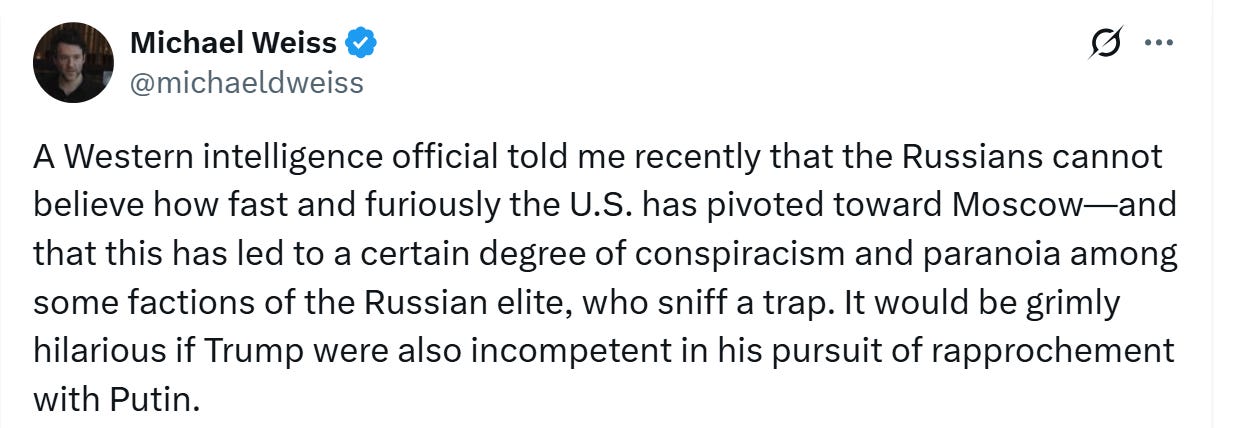An insightful piece by veteran journalist James Brooke is generating buzz in Washington. In it, Brooke delivers a sharp dispatch on the state of the war for Ukraine and Europe’s unraveling security architecture. His assessment is worth considering. The future of the war for Ukraine could hang in the balance.
Brooke’s big take: Vladimir Putin appears to be slow-walking the peace process—buying time while betting that Ukraine, unsupported, will eventually crack. A closer look, however, suggests this may not be the case.
Recall that, just one month ago, Ukraine accepted Trump’s proposed 30-day ceasefire. Putin responded not with concessions, but with cruise missiles.
As recently as Palm Sunday, Russian forces launched the deadliest attack of the year on the border city of Sumy, killing 35 civilians and wounding 119 more. Trump called the Palm Sunday strike a “mistake.” In stark contrast, Germany’s incoming chancellor Friedrich Merz labeled it a war crime and announced that one of his first moves in office would be to visit Kyiv and deliver long-range Taurus cruise missiles to Ukraine—breaking with Berlin’s long-standing caution.
Brooke notes how the political lines over peace talks are hardening.
As Trump hesitates, Merz is preparing to fill the leadership vacuum in Europe. The missiles that Germany is now willing to supply could strike the Kerch Bridge, one of Putin’s prized strategic assets and logistical lifeline for Russian troops in Crimea. Merz put it plainly: Ukraine needs to “get ahead” in the war.
Meanwhile on the battlefield, Russia is paying an enormous price for little gain.
Ukrainian officials report that 1,374 Russian troops are killed or severely wounded every day, meaning Russia is on pace to lose one million soldiers by June. Last year alone, 430,000 Russian troops were lost. Despite these staggering numbers, Russia has failed to seize or hold any major Ukrainian cities.
Brooke underscores the absurdity of Russia’s military position: to conquer all of Ukraine at its current pace, Russia would need 287 years.
Putin’s army is showing signs of desperation as a result. With equipment losses mounting—22,000 armored personnel carriers and over 44,000 vehicles destroyed—Russian troops are now seen fighting in Chinese golf carts, motorcycles, and 70-year-old GAZ-69 jeeps.
Some videos even show Russian soldiers using battered pink motorcycles, looted from civilians. Western analysts are calling it a “de-mechanization” of what was once one of the world’s most formidable armies.
To plug its losses, Russia is importing manpower and munitions. North Korea has dispatched 14,000 troops to help retake parts of the Kursk region. Meanwhile, TikTok ads are recruiting Chinese mercenaries. North Korea is also believed to be supplying half of the artillery shells fired by Russia last year, per a Reuters investigation.
Brooke also highlights a tectonic shift in warfare: artillery is no longer the “King of Battle,” at least in Ukraine.
Drones now account for 70% of battlefield casualties in Ukraine. And while the U.S. has largely gone silent, Ukraine is becoming a global drone superpower, with 200 factories expected to produce 4 million drones this year. Last Wednesday alone, Ukraine launched a 10-hour drone barrage into Russia, hitting 12 regions and three military airbases.
While the battlefield bleeds Russia’s resources, the Kremlin’s financial reserves are drying up. To fund guns and butter, Putin has burned through half of Russia’s sovereign wealth fund. At the same time, oil revenues are slipping. Russia’s national budget is based on oil priced at $70 per barrel—but today, Urals crude is trading around $50.
In the West, the policy divide is widening. Former National Security Council official David Shimer warns that the “era of U.S. military aid to Ukraine is ending.” The Kiel Institute confirms that no new U.S. military or financial support has been issued since January 9—under the Biden administration. In contrast, the incoming German government is preparing for a long-haul fight.
The bottom line: Brooke’s reporting presents the war for Ukraine as at a pivot point. Putin is bleeding resources and men but still believes time is on his side. Europe, led by a more hawkish Germany, may now take center stage—unless Trump chooses to reverse course, call Putin’s bluff, and reassert American leverage.
Read Brooke’s full piece here.
Are Russian Energy Ties “Illusory?”
On the war economy front, an equally compelling piece is making waves by Victor Jack at PoliticoEU. He delves into Belgium’s firm stance on Russian energy imports amidst ongoing geopolitical tensions.
In a candid interview, Belgian Energy Minister Mathieu Bihet expressed skepticism over the feasibility of rekindling energy relations with Russia, describing such notions as “illusory.”
Bihet emphasized that returning to pre-conflict energy dynamics with Moscow is unrealistic, stating, “It is fanciful to believe that from one day to the next, we will return to business as usual with Russia, saying, ‘We are going to act as if nothing happened.’“
Despite Belgium’s significant imports of Russian liquefied natural gas (LNG), Bihet reaffirmed the country’s commitment to phasing out these imports. However, he stopped short of endorsing an outright ban, advocating instead for a coordinated European Union approach to effectively reduce dependence on Russian energy.
Bihet’s remarks come at a time when discussions are emerging within Europe about the potential restoration of energy ties with Russia, including talks between the Kremlin and Washington regarding the Nord Stream pipelines. Nonetheless, Bihet remains doubtful of Russia’s intentions, asserting, “I doubt Russia’s good intentions on this front.”
Highlighting the broader implications, Bihet stated, “We are financing the war,” underscoring the urgency of reducing financial flows to Russia through energy purchases. He also pointed to nuclear energy as a viable alternative, advocating for an overhaul of Belgium’s nuclear policy to extend the lifespan of existing reactors and potentially double the country’s nuclear capacity.
So what? As Europe grapples with energy security and geopolitical challenges, Bihet’s position reflects a growing resolve among EU member states to reassess and realign their energy strategies away from Russian dependence. That’s good. Now, let’s see if they can stay the course.
Read the full interview by Victor Jack here.
It’s a Trap!
Finally on the lighter side—can there be too much of a good thing? Michael Weiss posted a scoop from a “Western intelligence official” that, if true, offers some priceless insight into the hivemind of the Kremlin.
“A Western intelligence official told me recently that the Russians cannot believe how fast and furiously the U.S. has pivoted toward Moscow—and that this has led to a certain degree of conspiracism and paranoia among some factions of the Russian elite, who sniff a trap. It would be grimly hilarious if Trump were also incompetent in his pursuit of rapprochement with Putin.”







